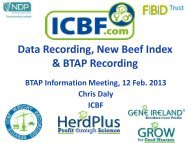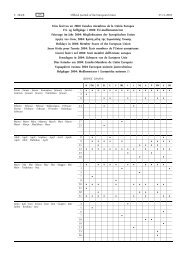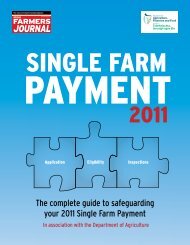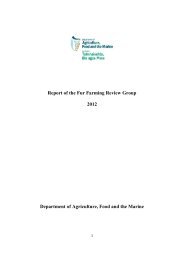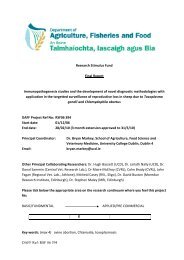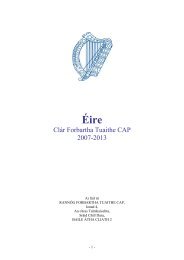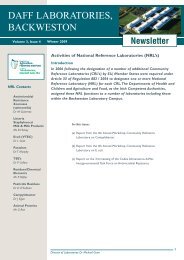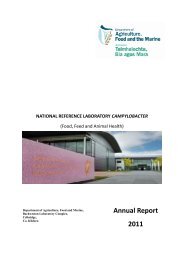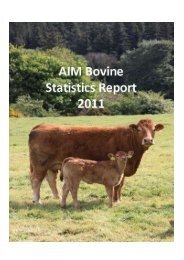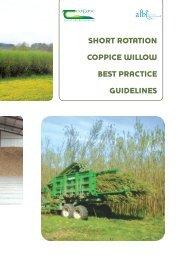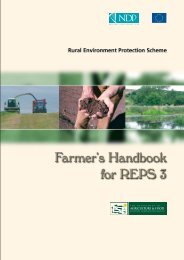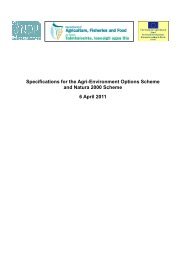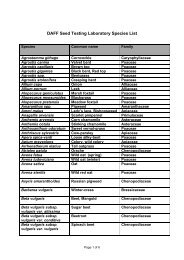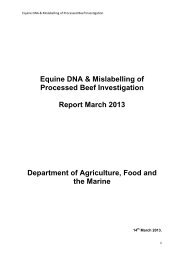Food Research Ireland - Department of Agriculture
Food Research Ireland - Department of Agriculture
Food Research Ireland - Department of Agriculture
Create successful ePaper yourself
Turn your PDF publications into a flip-book with our unique Google optimized e-Paper software.
There are 13 Institutes <strong>of</strong> Technology (IoT’s) in <strong>Ireland</strong>. Although<br />
historically not as actively involved (owing to a heavier lecture load),<br />
research now forms a core component <strong>of</strong> each <strong>of</strong> the institutes. The IoTs’<br />
play an integral role in creating <strong>Ireland</strong>’s postgraduate research<br />
community. They are particularly effective at pre-commercial research<br />
and have strong links with industry. Some are more active/relevant than<br />
others to the food sector e.g. Waterford, Cork, Carlow, Galway, Mayo,<br />
Letterkenny, Dublin, Sligo and Tralee.<br />
In order to facilitate change and embrace an internationally accepted<br />
model on infrastructure for research, many <strong>of</strong> the principal research<br />
bodies have embarked on a number <strong>of</strong> measures to enhance their<br />
research and development capacity.<br />
A key component <strong>of</strong> this infrastructural change has been the development<br />
<strong>of</strong> highly specialised research units within the principal institutions by<br />
concentrating existing capacity and resources. These highly equipped<br />
research groups/units have rapidly earned international recognition for<br />
excellence in research and have attracted international expertise and are<br />
providing training for under- and post-graduate students to a level<br />
unattainable in the past. Other key measures in the infrastructural<br />
reformation has been the willingness to adopt both an intra- and interinstitutional<br />
collaborative approach, recognising past strengths <strong>of</strong> specific<br />
institutions, and allowing them to champion ad hoc research programmes<br />
on a collaborative basis. These activities have provided a base <strong>of</strong> expertise<br />
for R&D to be undertaken by industry either within company or in<br />
collaboration with the research institutions in <strong>Ireland</strong>.<br />
IRISH FOOD RESEARCH STRENGTHS<br />
FOOD PROCESSING TECHNOLOGIES<br />
Irish research institutions have significant research expertise in<br />
processing technologies which can be accessed by all sectors <strong>of</strong> the food<br />
industry including, dairy including infant formula, meat, cereals, fish and<br />
shellfish, fresh-cut produce and beverages.<br />
DAIRY Process Design and Control is ongoing in a number <strong>of</strong> centres in<br />
<strong>Ireland</strong>. Considerable research has been conducted in the area <strong>of</strong> dairy<br />
powder technology, in particular optimisation <strong>of</strong> the spray-drying<br />
process, controlling powder stickiness and in developing ingredients with<br />
characteristics suitable for a variety <strong>of</strong> processing conditions, e.g. heat<br />
stable, flowable etc. <strong>Research</strong> is also being carried out in the area <strong>of</strong><br />
applications <strong>of</strong> high pressure and on-line sensors for dairy products. The<br />
use <strong>of</strong> high pressure processing in meat has also been explored.<br />
Non-thermal process technologies including ultrasound (US); high<br />
intensity light pulses (HILP); ultraviolet light (UV) and high voltage pulsed<br />
electrical fields (PEF) to provide more gentle process technologies to<br />
preserve and extend the shelf-life <strong>of</strong> beverages and ozone are also being<br />
investigated. Extraction technologies are also being developed. These<br />
technologies may also be applied to meat products.<br />
Cereal process technology focuses on optimisation <strong>of</strong> formulations and<br />
processes for novel product development, some <strong>of</strong> which include<br />
extrusion, fluidised bed and high shear. New healthy snack food<br />
products are being developed from cereals for elderly consumers.<br />
<strong>Research</strong> is ongoing on technology optimisation to minimise losses <strong>of</strong><br />
vitamins and minerals from fresh-cut fruits and vegetables. Antioxidant<br />
status in processed fruits and vegetables is also being investigated. A<br />
Hyperspectral Imaging System for the non-destructive assessment <strong>of</strong><br />
mushroom quality and shelf life prediction and technologies to identify<br />
sub-standard batches <strong>of</strong> mushrooms are also the focus <strong>of</strong> Irish<br />
researchers.<br />
<strong>Research</strong> expertise in packaging technologies is also available including<br />
PACK-in-MAP, a web-based s<strong>of</strong>tware tool to help companies optimise<br />
modified atmosphere packaging (MAP) for fresh and fresh-cut fruits and<br />
vegetables. The optimised packaging solution can recommend the most<br />
cost effective packaging material, gas atmosphere and temperature<br />
conditions to extend shelf life, quality and safety <strong>of</strong> fresh-cut produce.<br />
<strong>Food</strong> <strong>Research</strong> <strong>Ireland</strong><br />
▼<br />
56



